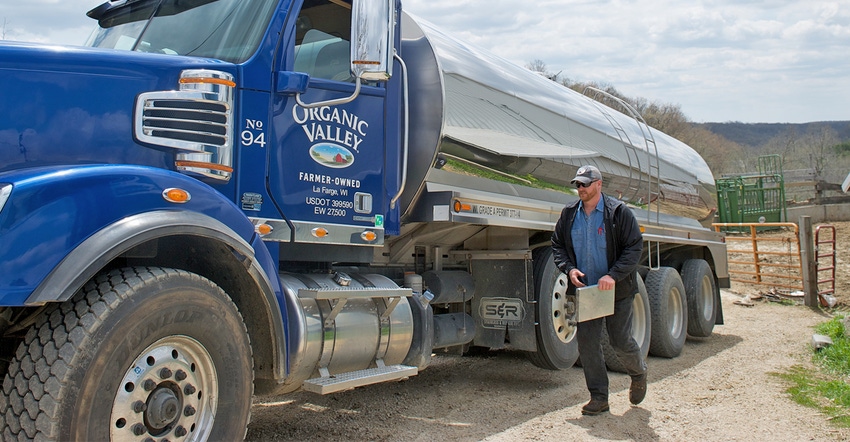November 7, 2018

The organic trend was just beginning when seven produce farmers got together to form the Coulee Region Organic Produce Pool in response to the farm crisis of the 1980s. That kicked off an organic movement in southwest Wisconsin that led to Vernon County, home of now international Organic Valley, developing the highest concentration of organic farms in the nation.
Other counties in the area are close behind, helping to make Wisconsin the No. 2 state in the nation for organic farms. It’s first in dairy, beef, hogs, sheep, broilers, eggs, goats and row crops, and behind only California in vegetable production.
Headquartered in La Farge and now in its 30th year, Organic Valley is the largest farmer-owned organic cooperative in the U.S. and produces one of the world’s largest organic consumer brands. Its members produce 14% of all organic milk in the U.S. — $1.1 billion worth in 2016. Its humble beginning was as the Coulee Region Organic Produce Pool, or CROPP, and its CEO still is George Siemon, the farmer who called the first meeting of prospective members.
Variety of products
Travis Forgues, vice president of farmer affairs, points to a three-tier strategy of branded, private label and bulk sales areas to “provide a lot of baskets to put eggs in for a whole lot of customers.”
“In all, there are 1,400 total items,” says Lynn Snifka, former manager of media relations. The co-op’s website lists as its products milk, cheese, butter, yogurt, snack items, single milks, eggs, whey protein shakes, produce, beef, pork, chicken and turkey. Snifka explains that the co-op works with organic processors for meat products.
“We have a lot of partnerships,” she says, including a grower pool to raise organic hay and grain for sale to members.
Organic Valley has grown to about 2,000 members in the U.S., Canada, Australia and the United Kingdom. It markets in all 50 states and 25 countries, working with sister co-ops in the U.K.
Dairy is its major business, and it employs 932 workers — 400 in La Farge and hundreds more at the Cashton, Wis., distribution center, according to Forgues, plus even more at a regional milk plant in Hartland, Wis. That facility was started mostly for produce to sell locally, Snifka says, and then expanded to cheese, and then bottled milk. Now it has a wait list of prospective members.
“We do a lot and we’ve grown a lot,” she says. “Our primary purpose is to keep farmers on the land. They just want to make a living doing what they love.”
But “there’s no shortage of milk right now,” Forgues adds ruefully, so the co-op employs “a lot of supply management tools. We have a quota.”
Snifka notes these statistics about the co-op’s members: 42% are Amish or Mennonite; the average age is 46, compared with a U.S. average of 56; the average farm is 273 acres, with 72 cows and total milk production of 16.3 million cwt. Production in well-established organic operations, she says, “is pretty comparable” to conventional farms.
Renewable energy
Organic Valley also is pursuing a lead role in renewable energy from solar, wind and geothermal.
“We will be 100% renewable-powered by 2019,” Snifka says.
Members can apply for funding assistance from the co-op to help finance community projects such as parks and baseball diamonds.

PIONEER: George Siemon is CEO of Organic Valley.
The co-op has an extensive website, which claims: “Our friends and neighbors around the Coulee region were discarded by a bankrupt agricultural system, and we were told to ‘get big, or get out!’ Industrial, chemical farming was the only existing option for survival. Never mind its effects on our health, our animals, and our environment.
“But we didn’t want to be industrial, chemical farmers. And we didn’t want to be at the mercy of corporate agriculture. We knew we had to do something. So, one farmer, George Siemon, put up posters calling us to band together. And we did. Family farmers filled the county courthouse and we all agreed: There had to be a better way — a more sustainable way — to continue farming like we always had. In a way that protects the land, animals, economy and people’s health.”
That commitment has remained even 30 years later, Siemon says. “Today we are focusing on our role as a pioneering farmer brand of the highest integrity in the organic market.”
Westby Co-op Creamery adds organic brand
Adding to the organic growth trend in southwest Wisconsin and all over the state is Westby Cooperative Creamery, also headquartered in Vernon County. Now in its 115th year, it’s one of the oldest dairy co-ops in the nation, and joined the organic movement in 2005 with just two patrons.
Last year, the Westby Organic brand was launched, offering four products: 4% and 2% small curd cottage cheese, sour cream and French onion dip. Hard cheeses, yogurts and other dairy dips have been added since.
Also last year, Gov. Scott Walker proclaimed the city of Westby the Cottage Cheese Capital of Wisconsin. The co-op, which began as a buttermaker, is the only producer of cottage cheese, both organic and conventional, in Wisconsin. Accepting milk from both organic and conventional dairy farms, all rBST-free, over half of its members are organic producers, and their cows supply nearly 60% of the co-op’s total milk intake.
Pete Kondrup, Westby Co-op’s general manager, says the Westby brand market territory is mostly Wisconsin and Minnesota, all within 30 minutes. Other brands cover most of the country.
Kondrup has been the general manager for 15 years and is credited with helping the cooperative build to where it is today. As the market expands, he’s hopeful the co-op will be able to take on additional producers. Currently there are 45 conventional patrons and 160 organic patrons.
Cottage cheese has been a co-op staple since the 1940s. Westby’s website cites Best of Class cottage cheese entries in the 2015 and 2017 U.S. Championship Cheese contests and at the 2016 World Dairy Expo competition. This year its 4% large curd earned second place at the World Championship Cheese Contest. Cottage cheese is produced 24 hours a day, seven days a week to meet demand, and it’s made under the supervision of Chris Dach, a 40-year veteran cheesemaker.
There are more steps involved in cottage cheese production than in hard cheeses, Kondrup says. “It’s 12 to 13 hours. You’ve got to handle it more carefully.”
The co-op added its yogurt lines in 2005. “It was difficult to set up,” Kondrup says. “There was a lot of trial and error.”
Product samples are available at the co-op’s cheese and gift store and in grocery stores across the state, plus some in Minnesota, Iowa and Michigan, and online.
Buchholz writes from Fond du Lac, Wis. This is the third story in a three-part series about Wisconsin’s organic farming industry. Read the first and second stories too.
About the Author(s)
You May Also Like




